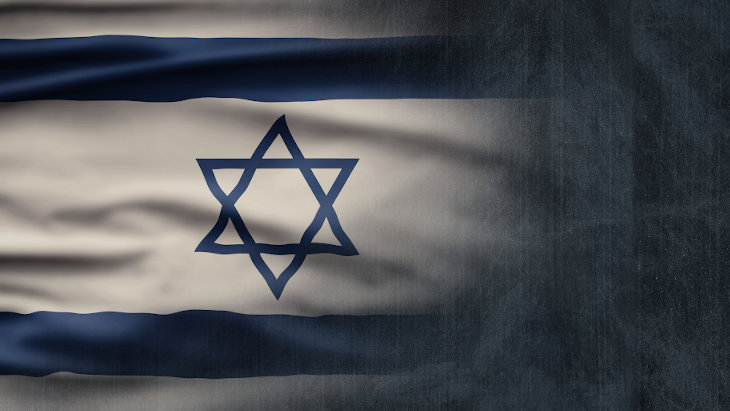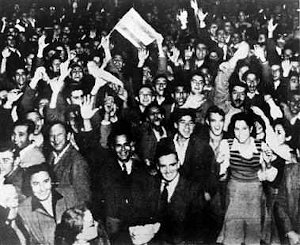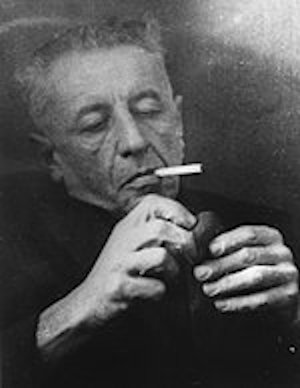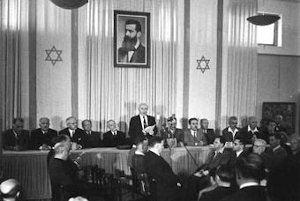 Iran’s Attack on Israel
Iran’s Attack on Israel


12 min read
24,000 Israeli soldiers have sacrificed their lives for the protection of the Jewish state.
“The state will not be given to the Jewish people on a silver platter.”
Those words – which have become the title of one of Israel’s most famous and beloved poems – were uttered in December 1947 by Chaim Weitzmann, the first President of the State of Israel. When he said them, the nations of the world, voting in the United Nations, had recently overwhelmingly approved the partition of the region called Mandatory Palestine. This area had been ruled by Britain for a generation, and now the British wished to get this troublesome Middle Eastern area off its hands. Much of Mandatory Palestine had recently become a new nation, the Kingdom of Jordan. Now the fate of the rest of the area known as Mandatory Palestine was turned over to the UN.
The UN set up a committee to study the situation and they made a recommendation: the region should be further divided into two nations. One part should become yet another independent Arab country. A tiny sliver of land along the Mediterranean, which was home to 660,000 Jews and had a Jewish majority, should become an independent Jewish homeland, the first independent Jewish state in 1,877 years.
The stakes were incredibly high: not only the survival of the Jews living in Mandatory Palestine depended on the vote, but so too did the fates of over 300,000 Holocaust survivors who were still languishing in camps in Europe who longed to move to the Land of Israel. In addition nearly a million Jews who lived in Arab countries faced riots and massacres at the hands of their Muslim neighbors. They also looked with longing at the Land of Israel, hoping they could find safety and refuge there.
On November 29, 1947, the United Nations voted. Country after country cast their ballots. The results soon became clear. By a vote of 33 to 13 (with 10 abstentions), the nations of the world had voted to create a Jewish state.
Years later, Chaim Herzog (who would go on to serve as Israel’s president from 1983-1993) recalled the joy of hearing the UN vote unfold:
On the never-to-be-forgotten night of 29 November 1947 the entire nation was glued to the radio as Moshe Medzini, correspondent of Palestine Radio, reported that the General Assembly was voting to decide whether we would achieve statehood. One by one the name of each member nation was called and each announcement was made – Yes, No, or Abstention. The United States, the Soviet Union, and France voted in favor; Britain abstained. Finally, the announcement was made; the recommendation had been adopted by a vote of thirty-three in favor and thirteen against, with ten abstentions.
Pandemonium broke out and the entire Jewish population was seized with joy. For that moment, all bitterness and remorse over past injustice disappeared. In Tel Aviv, in Jerusalem, in every town of Palestine, Jews poured into the streets cheering wildly. People of all ages spun around in euphoria, dancing the hora. (From Living History: The Memoirs of a Great Israeli Freedom-Fighter, Soldier, Diplomat and Statesman by Chaim Herzog. Weidenfeld Nicolson, London: 1997.)
When Chaim Weitzman was asked for his assessment of the UN’s partition vote, he explained that the vote was but the first step in establishing a Jewish state, proving that the global consensus supported a Jewish homeland in the ancient Land of Israel. But like anything worth having, it would have to be fought for: “The state will not be given to the Jewish people on a silver platter.” The state of Israel would have to be dearly bought, with Jewish blood.
For while much of the world was celebrating, Israel’s Arab neighbors made it clear that they would not tolerate the existence of a Jewish state, no matter what the circumstances. Britain’s mandate in the region was set to expire on May 14, 1948. If Israel dared declare its independence on that day, it faced not just one invading force but many: Israel’s borders with Egypt, Lebanon, Syria and Jordan all were vulnerable to attack, and the nascent Jewish state was vastly outnumbered by the combined forces of the much larger and more militarily advanced grouping of nations known as the Arab Legion, which was committed to preventing the establishment of a Jewish homeland.
One Israeli who celebrated the UN’s partition vote on November 29, 1947 was the famous writer and journalist Nathan Altermann. Born in Poland in 1910, he moved as a child with his family to the bustling city of Tel Aviv. (Established as a new Jewish city on sand dunes north of the city of Jaffa in 1911 with just eleven residents, by 1948 it had grown to a busy metropolis of 230,000.) Altermann joined a joyous crowd at Tel Aviv’s Cafe Kassit, a popular cafe with the city’s literary figures. As he and his friends drank toasts to the UN’s vote, Altermann overheard two of his acquaintances whispering together.

Yosef Avidar was a senior commander with the Haganah, the Jewish defense group. He was talking with Yitzhak Sadeh, the founder of the Palmach, the Hagana’s elite strike unit. How many Jews would die defending a nascent Jewish state they wondered? They estimated that perhaps 10,000 Jews would be killed by Arab armies if they dared make the UN’s vote a reality and establish a Jewish homeland.
Altermann stopped celebrating. One of his friends later recalled that suddenly his face was “filled with anxiety and pain”. Altermann, like many Jews, had heard Weitzmann’s warnings that a Jewish state would not be simply handed to its inhabitants on a silver platter. He realized that they’d have to fight and suffer for the creation of a land to call their own.
 Nathan Altermann
Nathan Altermann
That night, Altermann went home and started working on the poem that would become his best known work. Titled Magash Hakesef, “The Silver Platter”, it envisioned the toll that creating a Jewish state would take. He described a war-torn land, a homeland of “smoky frontiers” still burning from battle. He wrote of a Jewish homeland that was “torn at heart but existing”, one experiencing both “terror and joy” together.
In the poem’s final, haunting passages, Altermann conjured up the image of two young Jewish soldiers, a boy and a girl, who are battle-weary and fatigued, covered with the dirt and grime of the long, hard war they’ve been fighting. As the poem continues, it becomes clear that these two young Jews are no longer among the living. As they stagger into view, an entire nation gazes on them, wondering who just who these exhausted, injured soldiers at the front lines defending the first Jewish country in nearly two thousand years might be. Finally, with weary gazes, the two young soldiers reply softly: “We are the silver platter on which you were handed the State of Israel.”
British rule of Mandatory Palestine came to an end on May 14, 1948. On that day, the leaders of the Yishuv, the Jewish communities in the Land of Israel, came together in Tel Aviv to proclaim the establishment of their state. They rose to their feet and sang the Hatikvah, Israel’s national anthem. Then David Ben-Gurion, Israel’s first Prime Minister, read out the words that reestablished a Jewish state in the land of Israel: “...by virtue of our natural and historic right and of the resolution of the General Assembly of the United Nations, do hereby proclaim the establishment of a Jewish state in the Land of Israel – the State of Israel…. The State of Israel will be open to Jewish immigration and the ingathering of exiles.”

Wild jubilation erupted throughout the land. Golda Meir (who was born in Ukraine and narrowly escaped being murdered in anti-Jewish pogroms as a child, and would serve as Israel’s Prime Minister 1969-1974) recalled her intense feelings at that moment:
The long exile was over. From this day on, we would no longer live on sufferance in the land of our forefathers. Now we were a nation like other nations, masters – for the first time in twenty centuries – of our own destiny. The dream had come true – too late to save those who had perished in the Holocaust, but not too late for the generations to come… As Ben-Gurion read, I thought again about my children and the children that they would have, how different their lives would be from mine and how different my own life would be from what it had been in the past. (From My Life by Gold Meir. Weidenfeld & Nicolson, London: 1975.)
Golda Meir’s celebration was tinged with terror. She’d just come back from a top secret mission to Jordan where she met with King Hussein Abdullah and pleaded with him in vain not to attack the Jewish state. As she drove back to Israel, her advisors warned her that up to 50,000 Jewish soldiers might die in the ensuing war, and estimated that Israel had only a 50% chance of prevailing against the superior military might of its Arab neighbors.
Within hours of Ben-Gurion’s declaration of the establishment of the State of Israel, the new Jewish country was invaded by Egypt, Lebanon, Jordan, Syria and Iraq. “How beautiful was this day, May 14,” an Arab Legion officer wrote, “when the whole world held its breath anticipating the entry of seven Arab armies into Palestine to redeem if from the Zionists…” The Transjordanian Arab Legion was led by a British officer, Sir John Bagot Glubb, who recalled that in Jordan’s capital Amman, “the flat roofs and the windows were crowded with women and children, whose shrill cries and wavering trebles could be heard above the roar and rattle of the vehicles, and the cheering of the crowds of men beside the road. The troops themselves were clapping and cheering. In others, they were laughing and waving to the crowds as they passed.” The scene was repeated in countless other Arab cities and towns, as residents celebrated what they believed would be the swift destruction of the new State of Israel. (Quoted in A History of Israel From The Rise of Zionism To Our Time by Howard M. Sachar. Alfred A. Knopf: New York: 2002.)
The war was to last for nearly a year and devastated every corner of the state of Israel. In May, 1948 the Israel Defense Force consisted of a rag-tag army of amateurs and volunteers; within a year it had become a professional force of over 100,000 full time men and women. The crucible of this transformation was a total war for Israel’s very survival.
The other branches of Israel’s military were even more hastily assembled in the midst of fierce fighting. Israel’s navy consisted of unseaworthy vessels that had ferried desperate Holocaust survivors to its shores illegally during British rule. Many of Israel’s air force planes were former US bombers that were bought as scrap. Despite overwhelming odds, Israel’s fighting men and women – often mere youths – began, through months of war, to prevail. Tragically, at every turn, there were heavy casualties. More and more, the ghostly young soldiers of Nathan Altermann’s poem were becoming a reality, as first hundreds, then thousands of young Israeli soldiers lost their lives.
The final action of the war was Operation Yuvda in March, 1949, when Israeli forces captured the Red Sea port of Eilat. Between February and July, 1949, Israel signed armistice agreements with Egypt, Jordan, Lebanon and Syria. (Iraq refused to sign an armistice treaty with the Jewish state, and remained in a technical state of war with Israel.)
Despite the temporary peace, the toll was terrible. Entire families trembled for many months inside bomb shelters. Farmers were shot by snipers as they tended their fields. Families were attacked and massacred by Arab forces in some border towns. Old men, young children – all faced daily bombing and shooting and constant threat of total annihilation.
The toll on Israel’s soldiers was heavy: 6,373 Israelis were killed in action – fully 1% of the county’s population. Within a few years, Israel’s population grew enormously as Jews from all over the world found refuge in the new Jewish homeland. Within three years, the population of Israel doubled. It grew exponentially later on, as Jews from Arab nations, from Ethiopia, from Europe and from the Soviet Union all poured into the Jewish state.
Each year on Yom Hazikaron, Israel’s Memorial Day, these Israelis join together to thank these brave soldiers from Israel’s War of Independence and the many subsequent wars that Israel has fought. Nearly 24,000 men and women have been killed defending the Land of Israel since 1860, when Jews first began leaving the safety of walled cities like Jerusalem and began building new towns and settlements. They paid the ultimate sacrifice so that we Jews around the world might continue to have a Jewish homeland.
In the words of both Chaim Weitzmann and Nathan Altermann, these brave young men and women have given us all a timeless gift. They are all the “silver platters” on which we are given the Jewish state of Israel. This Yom Hazikaron and every day, let us honor their memories and their sacrifice.
Here is an English translation of Nathan Altermann’s poem The Silver Platter:
The Silver Platter
The earth grows still.
The lurid sky slowly pales over smoking borders.
Heartsick but still living,
A people stand by
To greet the uniqueness
Of the miracle.Readied, they wait beneath the moon,
Wrapped in awesome joy before the light.Then soon,
A girl and boy step forward,
And slowly walk before the waiting nation;
In work clothes and heavy-shod
They climb In stillness.Wearing still the dress of battle, the grime
Of aching day and fired night
Unwashed, weary until death, not knowing rest,
But wearing youth like dewdrops in their hair.
-- Silently the two approach
And stand.Are they of the quick or of the dead?
Through wondering tears, the people stare.
"Who are you, the silent two?"
And they reply:
"We are the silver platter
Upon which the Jewish State was served to you."And speaking, fall in shadow at the nation's feet.
Let the rest in Israel's chronicles be told.
